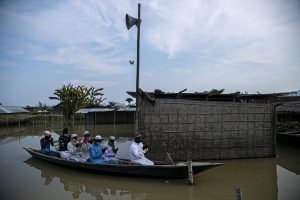In late October, the police in the northeast Indian state of Assam, which shares borders with Bengali-speaking Bangladesh and the West Bengal state of eastern India, sealed a humble museum depicting Miya culture, or the culture of Bengal-origin Muslims, and arrested three persons associated with the event. The arrested were booked under India’s anti-terror law, the Unlawful Activities (Prevention) Act.
This episode emerged as a new entry in a long list of alleged persecution of Muslims, a religious minority in India who comprise 14.23 percent of India’s population according to the last census in 2011. Persecution of religious minorities has surged since 2014 when the Hindu nationalist Bharatiya Janata Party (BJP) came to power in India. Assam, where ethnic conflict between Assamese-speaking and Bengali-speaking populations is not new, is at present ruled by the BJP.
Authorities shut down the Miya museum soon after it was inaugurated on October 23 in the Muslim-majority Goalpara district. The museum had on display some agricultural and fishing equipment, hand towels, and the lungi, a men’s skirt generally associated with Bengali-speaking Muslims, even though some Bengali Hindus also wear it. Mohor Ali, who created the museum at his home, said these were the items that the Miya community identified with.
Police sealed the museum, citing it was housed in a home built under the Pradhan Mantri Awas Yojana (PMAY), a government housing scheme for the poor. They said that the premises were being used for the wrong purposes – PMAY houses are to be used for residential purposes only.
Soon, the top brass in the Assam government and BJP leaders challenged the very idea of highlighting Miya identity. At a press conference, Assam Chief Minister Himanta Biswa Sarma asked, “Is there any community in the name of Miya?” He said that the organizers would have to face police action if they failed to prove that items displayed at the museum belonged exclusively to the Miyas. Except for the lungi, everything else is used by the Assamese people, he said.
Assam police, however, claimed that the arrest and slapping of terror charges happened in connection with a separate case. Organizers of the museum were accused of receiving funds from banned terror organizations such as al-Qaida and the Bangladesh-based Ansarullah Bangla Team.
Speaking to this writer over phone, Nasir Uddin, a resident of Goalpara district who was formerly with the Asom Miya Parishad, a forum of the Miya people, said that the charge of terror funding was “ridiculous.”
“The museum displayed bamboo and cane-made, hand-crafted items of daily use, collected mostly from local people. It wouldn’t have cost more than a few thousand rupees. Who would approach terror organizations for such small funds? The charge is unbelievable,” he said.
For the BJP, and the state’s chief minister, however, the very assertion of Miya identity is dangerous.
The cultural assertion of Miya identity came to the limelight in 2016 onwards. The main trigger was the Indian Supreme Court’s 2013 direction to Assam to update the National Register of Citizens (NRC) for the state. People who would fail to prove the existence of their family names in Assam’s electoral roll before midnight of March 24, 1971 — just before Bangladesh’s Liberation War began — would be deemed infiltrators and deported.
Ethnic conflict between the Assamese and migrants, especially of Bengali identity, has been a dominating force in Assam’s politics for many decades, often leading to clashes, bloodshed, and destruction of property. It has been alleged that migration from Bangladesh has changed the demography of the state.
The old ethnic conflict took a new turn with the rise of the BJP in the state in 2016. After the NRC excluded 1.9 million Bengali-speaking residents of Assam from the citizenship list in 2019, Hindu nationalist forces sought to protect Bengali-speaking non-Muslims through the controversial Citizenship Amendment Act (CAA).
People excluded from the NRC included both Hindus and Muslims, predominantly of Bengali ethnicity. However, the implementation of the CAA, when it happens, would leave only Muslims to bear the brunt.
Miya poetry became a talking point in Assam in 2019, with the NRC list coming close to completion, and hundreds having already landed in detention centers. In 2019, Miya poets were targeted in police cases. In 2020, an Indian National Congress legislator from the state had mooted the idea of building a Miya museum, a proposal that triggered strong reactions from Biswa Sarma, who was then the state’s finance minister. He became the chief minister last year.
Sarma, who has often been branded “communal,” has been targeting the assertion of Miya identity since 2020, when he said: “It is a fight between two cultures. The so-called migrants — Bangladeshi Muslims — have started a new concept in Assam. They call it Miya culture, Miya poetry… Miya language… We have to protect the composite Indian culture and more particularly Assamese culture… And Assamese Muslims are firmly by our side.”
In 2021, he said that “Miyas are a threat to Assam’s culture and identity” and that he did not want “Miya votes.”
After the recent incident, Biswa Sarma cited his past comments against the Miya community to say that he had been right all along. “We have now witnessed Miya poetry, Miya school, and Miya Museum. I have been talking about these challenges all the time.”
Following the arrests, even though many local Muslims considered the police action unjust and arbitrary, there has been no protest on the street from the members of the community, not even on social media. Speaking to this writer over the phone, one Bengali-origin Muslim from Goalpara district said, requesting anonymity, “Organizing protests or even publicly criticizing it could land one in jail, slapped with terror charges and his/her business closed down.”
But disquiet may be brewing in silence.

































